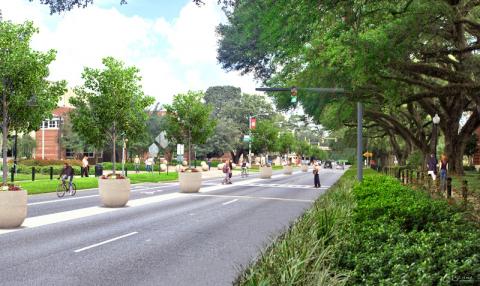A proposal to convert two of the four lanes of St. Mary Boulevard that cross through the ¬ť∂Ļ“Ļ – campus into bike lanes is slated for review by the Lafayette Consolidated Council.
The proposed lanes are part of the recently released ¬ť∂Ļ“Ļ – Master Plan, which will guide campus growth, development and change over the next 15-20 years. The plan includes provisions for campus structures, roads, spaces, signage and perimeter developments. Key components are detailed on the university‚Äôs website at .
The council will introduce an ordinance at its Tuesday, July 2, meeting to create a joint cooperative endeavor agreement with the University for striping, signs and related improvements for the installation of bicycle lanes along St. Mary Boulelvard, between Taft Street and St. Landry Street. Typically, ordinances are up for final approval two weeks after they are introduced.

¬ť∂Ļ“Ļ – President Dr. Joseph Savoie said the University‚Äôs master plan ‚Äúbuilds on an already solid foundation that has been enhanced recently by the construction and renovation of student housing on campus, the planned renovation of Fletcher Hall, the addition of the bike path/pedestrian path that connects the main campus with University Common and construction of additional parking towers.‚ÄĚ
LCG has been working simultaneously on a comprehensive plan that will steer Lafayette’s growth. Its plan incorporates the university’s master plan.
Another project to be undertaken by the LCG will extend the University Common bike path, providing a direct connection between the main campus and University Common.
The current two-mile path along Cajundome Boulevard spans two points between Eraste Landry Road and Johnston Street. The path will be lengthened from where it ends on Johnston Street, near the Ira Nelson Horticulture Center, to East Lewis Street.
A third, related project being planned by LCG will link the existing University Common trail with a more than 1-mile stretch that will end at the existing Parc Sans Souci trailhead, connecting the University Common bike path to downtown Lafayette.
‚ÄúWe want Lafayette and Acadiana to continue to be known for its extraordinary quality of life, and this is intended to be our part in helping us achieve these goals,‚ÄĚ Savoie said.
¬ť∂Ļ“Ļ – engaged an alumnus, Steve Oubre of Architects Southwest, to create its comprehensive plan.
The University master plan is an initiative of the University’s 2009-2014 Strategic Plan. It calls for development of a formal master plan for the use and expansion of University properties and facilities with an eye toward both continuity and preservation of the architectural style of the campus.
The master plan was approved by ¬ť∂Ļ“Ļ –‚Äôs Campus Planning Committee and endorsed by the University of Louisiana System Board of Supervisors.
‚ÄúThis campus master plan is not static. It‚Äôs intended to adapt to shifting circumstances,‚ÄĚ Savoie said.
During the last two years, Oubre led a series of public planning sessions to get input from students, faculty and staff, as well as community members. Oubre also collaborated with transportation experts, including traffic engineers, parking consultants and specialists in pedestrian and bicycle traffic.
‚ÄúBefore we started the plan, it was very important to us to understand the dynamics of this institution, not simply from an educational perspective, but also to determine what were the important pieces that the University needed and could provide to the community at large to make this place a very special place,‚ÄĚ Oubre said.
The development of University Research Park and university-owned frontage on West Congress Street is an integral element of the master plan. Oubre cited the opportunity to create a ‚Äúresearch village‚ÄĚ there. A market analysis showed the need to build more than 600 residential units for graduate students, young professionals and retirees.
The plan recommends doubling the size of the convention center that’s next to the Cajundome and building a hotel nearby.
Oubre said results of an analysis of space in academic buildings were a bit surprising. An assessment showed that there is adequate room to accommodate growth if some academic buildings on the main campus are renovated and spaces are reallocated. The issue was of particular interest because campus is landlocked.
Oubre said the overall goal is to create ‚Äúa campus village,‚ÄĚ where people live, work, shop and socialize at buildings within a walking distance of about 10 minutes. He noted that the main campus is only about three blocks from downtown Lafayette.
‚ÄúIf we do our job well, it will improve not only the visual quality but the academic success that this University experiences,‚ÄĚ Oubre said.
In October, ¬ť∂Ļ“Ļ – students voted to approve a self-assessed student fee to support implementation of the University master plan.
A key issue students want addressed is more parking spaces near campus, Oubre said.
The master plan calls for two parking towers to be constructed.
Additional parking, bikeways and bike stations would be provided on the perimeter of campus, as well.
An initial master plan initiative already under way is the ongoing renovation and expansion of the ¬ť∂Ļ“Ļ – Student Union. The $36 million project, which began with demolition work late last year, is slated for completion in December 2014.
Once finished, the new student union will be 30,000 feet larger than the old structure, which was 128,000 square feet. Construction is progressing on pace, said Bill Crist, ¬ť∂Ļ“Ļ – facilities director.
‚ÄúAbout half of the concrete slabs that will comprise the foundation of the new structure have been poured, and steel structural beams have been erected,‚ÄĚ Crist said.
Also, a new asphalt parking lot opened last week behind sorority row. It replaces a limestone one near the intersection of Coliseum Drive and Souvenir Gate.
Several final touches, such as paint striping and planting grass in the medians, will be completed in coming days.
